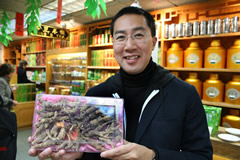"Hey David, what is that?"
David: "That¹s Ginseng.""Ginseng — or what I like to call Panax quinquefolium (from the Greek Panakos, or panacea) — is a perennial herb with a large, fleshy, slow-growing root. Ginseng is native to Manchuria and other parts of East Asia, and has been cultivated and harvested there, as well as in Korea and Japan, for thousands of years. Lesser known is that ginseng is also native to North America, and was prized by Native Americans as a natural remedy. Today, one of the leading areas of ginseng cultivation is...Wisconsin! |  |
| "'When consumers want the best ginseng, they ask for Wisconsin Ginseng, the world¹s finest,' proudly states the Ginseng Board of Wisconsin. Move over, suds-lovers and cheeseheads! According to Ellen Lii of Ten Ren Tea & Ginseng Co. (75 Mott St.), Wisconsin shares the same latitude and favorable climate as the best locales in China for cultivating the root. And most Wisconsin ginseng is exported to Hong Kong. | |
 "If you stare at a ginseng root long enough, you can see that it resembles the human body. Okay, some bodies more than others, but the point is that these are the most desirable roots for those in the know. The Chinese name for ginseng, Jin-chen, means 'like a man.' Interestingly for you anthropology buffs, the American Indian name for the plant, garantoquen, means the same thing.
"If you stare at a ginseng root long enough, you can see that it resembles the human body. Okay, some bodies more than others, but the point is that these are the most desirable roots for those in the know. The Chinese name for ginseng, Jin-chen, means 'like a man.' Interestingly for you anthropology buffs, the American Indian name for the plant, garantoquen, means the same thing.
"The older the root (and they can be as much as a century old) the greater the value, since their longevity is said to permeate the one who ingests it. As you also might guess, the older the root, the more expensive. Half a pound of 30-year-old ginseng can set you back $2,800. But you can also get very good ginseng for about $20 per half pound. A popular way to take it is in tea, and Ten Ren and other stores sell a variety of ginseng-laced brews.
"While American research has not embraced the root, and the FDA classifies it not as a drug but as a 'generally recognized safe food,' or GRAS, ginseng is claimed to lower blood sugar and cholesterol, decrease stress, increase stamina and facilitate relaxation."
Where to get ginseng
Ten Ren Tea & Ginseng Co. at 75 Mott Street (between Canal and Bayard) has a wide assortment, and ginseng can be found at a variety of food, herb and gift shops throughout Chinatown as well.